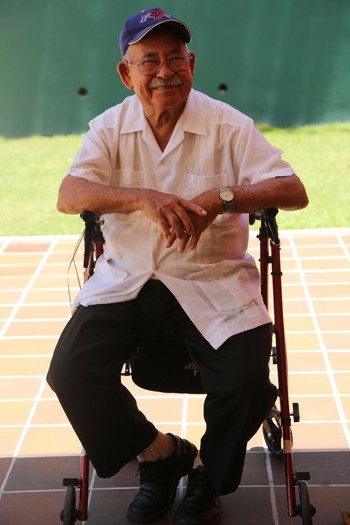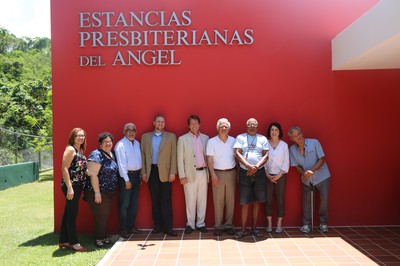Nestled within the community of Hormigueras (literally, “ant hill”), the Estancias Presbiterianas del Angel retirement home—once nothing more than the vision of one Presbyterian congregation—is today the dwelling place for 112 low-income senior citizens.
The Iglesia Presbiteriana Central de Mayagüez had long owned a five-acre parcel of land but didn’t have a vision for how to use it. When Eduardo Miranda became pastor of the congregation, ripe with vision for how it might reach beyond church walls to the wider community, the seeds of this innovative new church-government partnership were planted.
Estancias Presbiterianas is a 108-room facility. Begun in 2003 with a proposal to the federal housing program under section 202, the church received an $11.3 million grant that funded the construction of the housing facility.
Recently a delegation from the Presbyterian Mission Agency, in Puerto Rico for a 1001 New Worshiping Communities gathering, was able to meet with Miranda and take a tour of the facility to see firsthand what Iglesia Presbiteriana Central de Mayagüez had done by combining its resources and its vision to reach out to a community in need.
“Estancias Presbiterianas del Angel, birthed from the vision of Pastor Miranda, is a wonderful example of what the church can do if it is willing to think creatively and take risks, understands the real needs and opportunities in its local context, and continues to focus on its mission to serve Christ in the world,” said Deputy Executive Director for Mission Roger Dermody.
It’s just such creative thinking that the 1001 movement hopes to ignite within the presbyteries, synods, congregations, and seminaries of the Presbyterian Church (U.S.A.). The Synod of Boriquen (Puerto Rico), its three presbyteries, more than 75 congregations, and the Seminario Evangelico de Puerto Rico —a covenant partner—are part of the PC(USA).
“This has been a model project for providing housing to low-income seniors,” explained Miranda. The monthly rent is $424 for those who can afford it. For those who cannot, subsidy vouchers are available from the government.

Residents who cannot afford the $424 monthly rent are able to apply for housing vouchers to cover the difference in cost —photo by Erin Dunigan
There are three requirements for those who wish to apply for housing at Estancias Presbiterianas: financial need, age (62 or older), and the ability to live unassisted. “There are no religious requirements to be a part of this project,” explained Miranda, emphasizing that all are welcome regardless of denominational affiliation.
Hector Rodriguez, (PC)USA associate for Hispanic/Latino-a Congregational Support, has been impressed by the Mayagüez congregation’s innovation in outreach. “It is wonderful to see a congregation with such a big vision for reaching out to its community,” said Rodriguez. “We want to encourage more of this kind of vision.”
In the past, it was typical for the elderly to live with family as they aged. But, as Miranda explained, Puerto Rican society is changing. Extended life expectancy often poses a challenge to those caring for aging parents. Estancias Presbiterianas provides a solution to that dilemma.
“There are many people who live here who don’t pay anything because they are very low income,” said Miranda. Families are able to visit loved ones and know that they have a safe, clean, and caring environment in which to live.
For Miranda, Estancias Presbiterianas is just part of the call to live out the gospel amongst the least of these—whether they are found within the sanctuary walls or outside, without expectations or strings attached.
For Vera White, associate for 1001 New Worshiping Communities, the visit offered hope for the future. “During our time here, we talked with a number of people who had never thought of starting something new—or at least not for a very long time,” said White. “I could see light bulbs turning on in people’s eyes as we were talking.”
“We really see a new opportunity,” shared Rodriguez. “The only ones that can limit the work of the church is the church,” he continued.
Estancias Presbiterianas is just one expression of the Puerto Rican church’s commitment to finding new ways of tangibly showing the love of God to society’s most vulnerable members while meeting basic community needs.
It is a seed of a vision of things to come—a harvest that is plentiful. And one that already seems to be bearing much fruit.
Erin Dunigan is a freelance writer, photographer, and pastor who lives in a small coastal community in Baja California, Mexico when she is not following her wanderlust out into the world.

